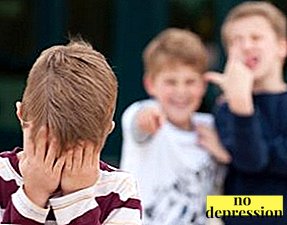Without communication, the process of education, the formation of the individual, its interaction with other people, professional activities and the existence of society as a whole as such are impossible.
In all spheres of human life various types of information is transmitted through communication - from the cultural heritage from the older generation to the younger generation to the interaction of employees in an industrial enterprise.
However, communication does not always reach its goal. What is effective communication, what are its criteria and what factors determine the effectiveness of communication between people?
Definition of basic concepts

Effective communication - what is it in psychology?
Currently, the importance of communication in a person's life is constantly increasing, and therefore require additional study of the technology of effective communication, as well as mastering the skills that contribute to this.
The effectiveness of communication in psychology means optimal way to achieve the goal of communicationin which the loss or distortion of the true meaning of the meanings, attitudes and reactions transmitted to a person and derived from him is minimized.
Elements of successful communication
American sociologist G. D. Laswell The following elements of effective communication were proposed:
- Sender - the person who transmits this or that information.
- Message - directly the information itself that you want to convey to the addressee.
- Channel - the way in which the message is sent - verbally, non-verbally (with gestures, facial expressions, posture), with the help of a written statement.
- Recipient - The person who receives the message.
- the confirmation - a signal sent by the recipient and indicating that he has received the message.
Criteria

To achieve efficiency in communication, its elements must meet the following criteria:
- The sender must choose optimal transmission channel information - verbally or in writing, correctly identify the intonation with which the message will be transmitted, or refer to non-verbal methods.
- Information must be clearly, fully and clearly stated for the recipient.
- The recipient must confirm that you accepted and understood information transmitted to him.
Only if these three criteria are met, can communication be considered successful.
The basics
The basis of effective communication lies knowledge of human psychology and his perception. The interlocutor who has mastered the skills of effective communication will be in a more advantageous position, it will be easier for him to achieve his goal in communication than the interlocutor unfamiliar with these concepts.
Ideally, communication carries productive characterIt is beneficial for both partners and leads to their interaction, strengthening of contacts and mutual trust. However, it should not contradict the basic principles of effective communication.
Principles

Principles of effective communication:
- Communication should be a two-way process. Only with the interest of all participants in the conversation in achieving its positive outcome will prerequisites arise for its effectiveness.
- The person to whom the message is addressed must make every effort in order to correctly perceive it.
- The person transmitting the message should do this as clearly as possible, concisely and clearly.
- A level of trust must be established between communicating people, corresponding to the situation under discussion.
- The emotionality of communication must correspond to the message being transmitted.
- Tolerance, as a means of increasing the effectiveness of communication, should be inherent in all participants of communication.
All participants should follow the principles of effective communication. The more aspirations they show for their observance, the more productive their interaction will be.
Conditions
Speech communication will be successful if the following conditions are met:
- Speech content should maximally match the purpose of communication, do not contain elements that are not related to the topic under discussion, be concise and adequate.
- Speech must be grammatically correct built accurately reflect the message that you want to convey to the interlocutor.
- Statement of thoughts should be logical and consistent. A well-built structure of the narrative contributes to its successful perception of the listener.

Factors
What are the factors contributing to effective communication? On the successful outcome of communication The following factors have a positive effect:
- Favorable environment in which the conversation takes place. For example, if a situation that implies intimacy, confidentiality of communication, suggests that the communicators are not heard by others, this will contribute to a confidential conversation.
- Compatible psychological characteristics of the participants of the conversation. These include the gender, age, character and temperament of the participants.
As a rule, communication is more successful in people of close age, and some types of people also interact better in character and temperament.
- Same social status. The interaction will be more successful with people belonging to the same social class.
- Trust atmosphere in the team, its cohesion. For example, with established benevolent norms of behavior in a team, professional interaction will be an order of magnitude more effective than in a team in which everyone is accustomed to defending only his own interests.
- Common goals and motives of interacting people. If a situation implies the achievement of a common goal, as a rule, mutual understanding is established between partners, leading to successful communication.

What are the factors that reduce the effectiveness of communication? These factors are significantly reduce the positive outcome of communication:
- The situation is not appropriate to the topic under discussion. For example, if you try to discuss a confidential conversation in a public place, the recipient - the person to whom the message is addressed, will avoid discussion.
- Different social status. Between people belonging to different social classes, often there is a barrier in communication.
It is due to the internal prerequisites of its belonging to another class, a sense of its superiority or, on the contrary, inferiority.
- Disunity in the team. The effectiveness of business communication will decrease significantly if, according to established standards in the team, everyone must protect their own interests on their own - even with the knowledge that this will adversely affect the solution of professional tasks.
- Different goals. With the initial striving to achieve various goals, especially when it is impossible to achieve a compromise that satisfies all parties, the effectiveness of communication decreases.
Personality properties affecting the effectiveness of communication
The communication process is influenced not only by general factors that affect all participants, but also by the individual personality characteristics of an individual:
- Extroversion-introversion. Extroverts are more active, open to others, quickly go to contact, which makes them more successful in communication compared to introverts who are prone to solitude, restrained, try not to express their emotions in public.
- Empathy. The high ability of a person to empathize with others contributes to a better perception of the interlocutor's emotions, which has a positive effect on communication. Individuals who are not prone to empathy often cause reciprocal indifference, which complicates the possibility of effective communication with them.
- Aggressiveness. Such a character trait, as aggressiveness, speaks of the tendency of the individual to aggressive behavior in various situations.
This feature of behavior makes communication difficult, often causes rejection by the interlocutor and a backlash, reduces the likelihood of extending a trust contact.
- Tolerance. Tolerance to the interlocutor helps to avoid conflict situations, to accept his point of view, which creates favorable conditions for creating compromise solutions, despite the difference in opinions.

Psychological aspects of the effectiveness of the communicative side of communication
Why the effectiveness of communication associated with the communicative side? A special place in communication is his communicative side - that is, the exchange of information.
At the same time, the effectiveness of communication is directly dependent on how exactly the exchange of messages between partners is established. Main psychological conditions achieving the effectiveness of communication for a person are the following:

- the ability to express your thoughts;
- the ability to perceive and understand the interlocutor;
- ability to interact with a partner.
These skills are formed not only on conscious, but also on unconscious levels - a person from childhood learns to make contact, to prevent the development of conflict situations, to behave in such a way that others can understand him.
A culture of speech
Significant impact on the effectiveness of communication has a culture of speech. If a person has sufficient vocabulary, it will be easier for him to state his idea to the interlocutor.
However, speech is not only a way of expressing thoughts, but also a means of knowing the world. An educated person will better understand his interlocutor, which will make communication more successful.
Cultural speech that meets the requirements of etiquette is also helps to establish friendly contact with others - the treatment of the rules of etiquette facilitates further deepening of contact with the interlocutor.
The language of modern man

The man of modern times to achieve the effectiveness of communication must use the full range of communication capabilities.
It includes not only a good command of speech, but also knowledge of the methods of non-verbal communication - gestures, postures, facial expressions, sometimes unconsciously expressing the interlocutor's emotions.
Knowledge of data nuances allows you to better understand the interlocutorand, therefore, develop a better communication strategy for achieving a particular goal. Moreover, these skills need to be constantly developed.
Effective communication training it will help to master the methods and techniques of communication, which can significantly increase the possibilities for a person’s self-realization, achieve success in the professional sphere, and also establish interpersonal relations.
Examples
- Effective communication in conflict. Returning from the army to the parental home, the son spent the day surrounded by relatives, and then in the evening was going to visit his close friends. Looking around the mirror, he heard the demanding voice of his father: “At 10 in the evening you should be at home.” Without ceasing his occupation, the son calmly said: “Forget it, papa. This is already in the past. Conciseness, confidence and calmness in this case were the best way out of the emerging conflict situation, since these qualities are inherent in a mature, independent man.
- Effective communication with children. The sketch from the movie “Gentlemen of Fortune” when the teacher addresses children who do not want to have breakfast is very revealing: how on earth we will return only for dinner. ”
Adjustment to the desires of children and the subsequent rejection of persuasion, to which children relate with prejudice, allowed them to shift their attention and look at the situation from the other side.
Methods, techniques, techniques and techniques

Effective communication techniques very numerous.
As a rule, they are based on the unconscious, automatic perception by the interlocutor of a particular situation.
- Repeat the name of the interlocutor. This will give him the impression of interest in his personality, will cause a feeling of satisfaction and positive emotions.
- Be interested in the personal life of the interlocutor - Especially those aspects of which he himself mentions while in society.
- Try to speak calmly, even being in a conflict situation.
- Fully listen to the arguments of the interlocutor - This will give you the right to express their own.
- Use more positive words. instead of those that have a negative connotation - for example, “I would prefer” instead of “I need”, “preferably” instead of “need”.
- Prepare for important conversations in advance. In this case, do not seek to predict the actions of the interlocutor, but rather pay attention to the argumentation of your position.
- Use your voice for more persuasiveness., highlighting intonation and pauses the most significant words and thoughts.
The effectiveness of communication can be constantly improved by taking the time to study the patterns and subtleties of communication.
Of course, quality data man develops unconsciously throughout his lifeHowever, it is always possible to significantly change the situation for the better by resorting to well-known methods of successful communication.
Tricks of effective communication:



